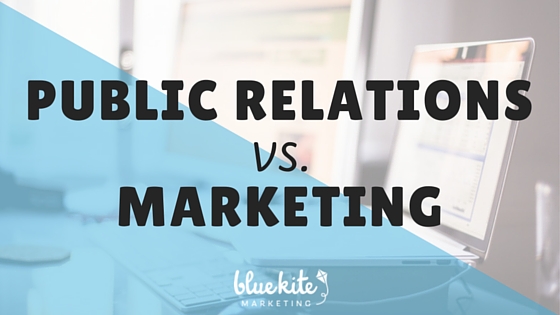A few weeks ago, I spoke at a local networking event about entrepreneurship. I shared the story of my business and how I got started.
After the event, a woman came up to me something I didn’t expect:
“What’s the difference between PR & marketing?”
My response?
“Not much.”
She was relieved. As a freelance writer, she said she had been trying to figure it out and never got a good answer. I don’t think she’s alone.
This is a popular conversation among people in my industry and there are strong opinions on either side. But, when it comes to small business owners, I think many are scratching their heads trying to discern the difference.
What is Public Relations anyway?
I think part of the reason PR and marketing get so confused is that public relations is so misunderstood. People typically think of PR as publicity or media relations. Although that’s certainly part of it, most PR practitioners will tell you there is so much more to it.
In my public relations class in college many years ago, PR was defined as “communicating with your publics” and publics could mean anything from customers, employees, investors, prospects and yes, even the media.
My boss at the PR firm I worked at right after college called it “the art of persuasion”. I always liked that.
Essentially, PR has always been deeply rooted in effective communications, which typically include:
- Media relations / publicity
- Crisis management
- Employee & internal communications
- Branding and messaging
- Investor relations
- Speaking engagements
How is Marketing Different?
Traditionally, marketing has been more associated with developing campaigns and promotions directly tied to driving sales. And, oftentimes, marketing includes public relations and advertising as components of an overall campaign.
For instance, some marketing activities can include:
- Email and direct mail campaigns
- Webinars, eBooks & other lead generation tools
- Pay-per-click campaigns
- Tradeshow participation
- Search engine optimization
Does the Difference Matter?
Although there are differences between PR and marketing, the line between them is becoming more and more blurred — especially when you add social media and content marketing to the mix.
After all, are you communicating with constituents or are you promoting your business? Oftentimes, the answer is both.
The differences between PR and marketing are much more apparent — and important — when dealing with large corporations. For instance, if you’re a publicly traded company, you’ll want a team who knows how to handle release of quarterly earnings and communicating with investors.
If you’re a small-to-medium business, the difference is less important. After all, you likely don’t have an entire department of people who handle these practices. If you’re lucky, maybe you have a person or two. And sometimes, you don’t have someone on staff at all.
What you need is a firm or consultant that integrates these practices and who can understand which tools to use and when. To do that, you should look at their capabilities and services.
The right companies and consultants should know how to integrate your marketing and PR effort to give you a better strategic approach. And, if they don’t offer all of that under one roof, they should be able to bring in the right team or work with other firms and consultants to present a unified approach.
Although this post only scratches the surface of this conversation, hopefully, it gives you a better idea of the differences and how this applies to your business.
What questions do you still have? Does this explanation help?




16 replies on “Public Relations vs. Marketing — What’s the Difference?”
It’s a great explanation, Laura. But I’m with you…the lines are blurring. The problem is that marketing has always defined it’s results and PR has not. Now PR is being required to measure results to real business goals and that means integrating with the other disciplines. A story in the NY Times, for instance, does not alone make the phone ring. But the story combined with email marketing, blogging, and SEO does. It’s no wonder people are confused.
Love your point about getting a story in the NY Times. It’s funny that while that’s such a big deal, that alone, won’t help your business (which is a shock to most). You’re right – both need to be both need to be tied to results. And, for it to work effectively, PR and marketing need to work together.
The PR firm I worked out right out of college had “communications” in the name, we said we did PR, but yet we would write marketing plans for our clients. I always thought that seemed so confusing (and it is). Heck, if our own industry is confused, so it’s no surprise that businesses and the general public is too. Thanks for weighing in!
Hey, Laura; thanks for including me in this story. Great recap of the blurry blend that is now PR and marketing. Funny thing is, I studied PR in school, but got a Journo degree; didn’t do any marketing until much later when I tried to differentiate from pure PR (to the chagrin of the large agency recruiters).
Now, with social media, as you’ve alluded, we have a total mashup. I blend the two in a powerful combination of deliverables, yet people still can’t figure out whom to hire. It’s challenging, and it’s up to the practitioner to help educate everyone on what it is we do.
Sounds like we have a similar background, Jayme. I got a journalism degree, but had a PR class. My first job was at a PR firm, then I was a marketing director at a non-profit, internal communications at a government agency and then a spokesperson for the courts. And now, much like you articulated in that post, I draw upon all of that experience to help clients.
You made a good point – we need to do a better job of educating what all of this means and what all of this means when you’re trying to hire someone.
Check out my blog where I try to describe the difference between Communications/Public Relations and Marketing http://www.jimmintz.ca/2008/06/05/marketing-versus-communications/
Thanks for sharing that, Jim. I like what you said about companies not getting too focused on the difference between marketing and PR. You’re right – it’s more about knowing which tools to use and when. Thanks for stopping by!
I have to say that there IS a difference between marketing and public relations, but at times, each can be a function of the other. Just like you said, the lines are blurring. I think there’s so much on the general umbrellas of “public relations” and “marketing” and that the general focus of each practice may be a littler different, that specialists in each are warranted. But, how many times do you see someone who is in charge of marketing AND public relations, especially in small companies. I see it a lot.
I have a marketing (and communications) background, so I often associate PR more on the marketing side rather than the journalism side, but that’s just me. Just like @ginidietrich:disqus mentioned, a lot of it lies in what is quantifiable. I find that most people make the assumption that marketing drives sales and PR drives awareness, when in reality, in can do both. Again, the lines are blurring.
The important thing to remember is that we’re all working towards a common goal. While the strategies and tactics may differ, working within each group (or working as each group) is beneficial to all. I would never suggest to get rid of one or the other. Each is essential.
Great points. While PR and marketing may require slightly different skill sets and focus on different things, they are working toward the same goal. And, because awareness is so nebulous, it’s important for PR to work in concert with the overall marketing of a company. Messaging is important. It helps reinforce what’s happening on the marketing side. So, if you are dealing with a larger company that separates these two departments, they’d better be working together or their results won’t be nearly as strong.
Thanks for stopping by to weigh in!
All excellent points!
Allow me to throw my hat into the ring as well. As the SVP and co-owner of one of the country’s most influential LTC insurance marketing agencies, I’ve grappled with this question before. Here’s my take: we represent many carriers and many products. When an agent phones in, we need to be able to pivot from selling Company A against Company B, to selling the merits of Company B against Company A (both of whom we rep). Another may call and ask for consumer-facing materials which strategically position Company A vs Company C. A third agent calls and needs advice how to sell Company B’s new inflation rider. That’s marketing.
Then, another call will come in from an agent who’s been referred to us and wants to know why he should sign up through our agency: we need to tell our story, our strengths, our history, our testimonials, our references. That’s PR. In fact, an agent a week ago found us through a press release. Others have found us through social media, or the articles we consistently publish. We keep a high profile…
No question the lines are blurry though. For instance, each Blue Kite column ends with a subtly-worded “call-to-action” (can you spot it?). Is this PR or is it Marketing? : )
Thanks for another good post, I always enjoy them!
Stephen D. Forman, LTCA
@ltcassociates
Thanks for your insight, Stephen! I would argue that both of your examples lean more toward marketing, but then again, the lines are so blurred that I don’t think it matters. What’s important is that businesses know what to communicate to which audience and at what time. Both PR and marketing play critical roles. Since there’s so much overlap now, it’s more about knowing which tools to use and when.
Thanks for sharing your thoughts, Stephen! Really appreciate the insight. And thanks for the kind words too! 🙂
I agree with much of what you have said, Laura. Insofar as you are mainly describing tactical activity of marketing and public relations.
At the overarching level, though, marketing is mainly about developing products and services to meet a need or want (which includes stimulating that need or want), whilst public relations is about driving organisational and organisational stakeholder behavioural change so that collectiveneeds and wants, if you like, are more closely aligned.
To go even further big picture, marketing is about generating sales/profit, whlst public relations is about making people happier with the society (including business environment) in which they exist. So whilst I admire much of what marketing can achieve and its approaches from a technical point of view, personally I am very happy to espouse the public relations approach to life!
Craig – I think your perspective very much outlines the traditional view of the differences. Though, I would argue that PR goes well beyond “making people happier”. And, perhaps that’s part of the problem with the industry – it’s misunderstood and has had a longstanding battle with determining ROI. I think PR is definitely important, but it works best when it’s integrated with marketing to achieve results.
Thanks for sharing your thoughts!
Quite Interesting. I really believe Craig Pearce has punched it square. It further reminds me of a speech delivered in 2001 in Taipei, Taiwan by Prof. James Grunig on the Role of Public Relatns. in Management and its overall contribution to societal and organizational effectiveness. Grunig sought to distinguish between PR and Marketing against the backdrop of need for “Excellence in Public Relations”. According to him, although both being management functions, Public relations addresses the corporate social environment(Publics), while marketing takes care of the economic environment (markets essentially, where satisfaction of wants and needs is done profitably). Publics are different from markets, however. Publics is made up more of social groups responding to an organization’s consequences on them whilst trying to participate in management decisions in ways serving their OWN interests. However, being communication experts, Public relations pros CAN function in a Marketing department to communicate with MARKETS, although this may affect their commitment to servicing the social environment if totally ignored. Grunig believes Excellent Public Relations would entail keeping the two functions as separate as possible based on the environments they serve.
I think this perspective is consistent with traditional views of the differences between the two. I don’t disagree, but I think the lines between them are getting blurred. After all, would you count social media as marketing or PR? You can communicate with prospects (marketing), customers (customer service), media (PR) and the general public (PR). I think the line between the functions used to be much brighter. Now, it’s far more imperative that the functions are mixed – or at least working very closely together.
Thanks for sharing your thoughts!
I totally concur Laura. Social Media seems to have changed everything. In my place, news break on twitter, online blogs and even blackberry messenger some 24(atimes 48) hrs before newspaper print. Its funny, because everyone seems to be his/her own journalist now.Shall we say having an Integrated Marketing Communications outlook as an SME would be advantageous?
What a very informative post. It really has difference between public relation and marketing. But what matters is, they have the same goal. This is to promote your business.